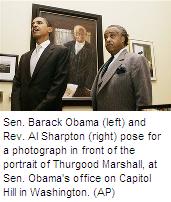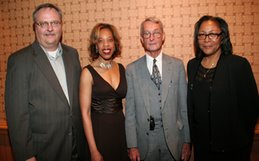 The Field’s Starting to Clear in Potentially Historic ’08 Race; More Hopefuls Announce
The Field’s Starting to Clear in Potentially Historic ’08 Race; More Hopefuls Announce For the first time in U.S. history, three viable Democratic candidates determined to become president in 2008 include a black man, a woman, and a Latino governor.
Sen. Hillary Clinton (D-NY), Sen. Barack Obama (D-IL) and Gov. Bill Richardson (D-NM), who is Hispanic, are perhaps the first convincing female and candidates of color to run for the nation’s most powerful office during the same political season.
The 2008 campaign for president -- which apparently has begun nearly two years early -- will not include a sitting president or vice president in the crowded field of candidates, a rare occurrence in American politics.
A large group of presidential hopefuls, both Democrats and Republicans, now are formulating campaign strategies, establishing exploratory committees, assembling campaign teams, calling potential supporters, identifying fund-raising sources and traveling to early primary states.
Last week, Obama met with Rev. Al Sharpton, who told reporters earlier that Obama’s candidacy seemed more about "razzle-dazzle" than substance.
On Saturday, Clinton spoke to 3,000 cheering supporters in Iowa -- home to the presidential caucuses in January 2008 -- and told the audience: "I’m Hillary Clinton. I’m running for president, and I’m in it to win it."
And Republican Rudolph Guiliani, the former New York mayor who rose to national prominence after 9/11, spoke to GOP leaders Sunday in New Hampshire -- where the first primaries will take place -- and is now recruiting a campaign staff after creating an exploratory committee.
Bottom line: It’s on.
"Both Republican and Democratic primary candidates battling for the nomination will have to aggressively define their positions on the war while, somehow, creating a broad agenda and vision for critical domestic issues," Peter Groff, a Colorado state senator and publisher of Blackpolicy.org, told BlackAmericaWeb.com.
"There are differences in the details of those platforms," Groff said, "but there are major themes that will be constant throughout: security, prosperity and stability." …..
The political landscape is indeed crowded, and in many political circles across the nation, there are already poignant questions about whether America is ready to elect a woman or a candidate of color for president.
Some top Democratic candidates who have either announced exploratory committees or expressed interest include Clinton, Obama, Richardson, former senator John Edwards, Sen. Chris Dodd (D-CT), Sen. Joe Biden (D-Del.), former Iowa Gov. Tom Vilsack and Rep. Dennis Kucinich (D-OH).
On the Republican side, early candidates and potential contenders include Sen. John McCain (R-AZ), former New York City Mayor Rudolph Guiliani, former Massachusetts Gov. Mitt Romney, former Wisconsin Gov. Tommy Thompson, former New York Gov. George Pataki, Sen. Chuck Hagel of Nebraska, Rep. Duncan Hunter (R-CA.), Ron Paul (R-TX), Rep. Tom Tancredo from Colorado; Arkansas Gov. Mike Huckabee, former congressman Newt Gingrich and Sen. Sam Brownback from Kansas.
"I think it still little too early, except to say that Republicans are poised for what will be a competitive race for the White House once the nominees from each party are selected," Tara Wall, senior communications advisor for the Republican National Committee, told BlackAmericaWeb.com.
Clinton, Obama and Richardson have gotten much of the media attention so far as Democrats have already assembled an early yet diverse field of candidates -- a stark contrast to the all-white Republican line-up.
"Democrats have a diverse field," one Democratic strategist told BlackAmericaWeb.com. "The Republicans have the same white guys on parade."
Sen. John Kerry (D-MA), who lost his bid for the White house in 2004, has decided not to enter the race in 2008.
"There are powerful reasons to want to continue that fight now. But I have concluded this isn't the time for me to mount a presidential campaign," Kerry said in a statement last week.
Several national polls show Clinton leading Obama by a fair margin for the Democratic nomination, and Clinton and Guiliani are tied, polls show, if the general election was held today. All of the candidates will have to raise millions of dollars for their campaigns, which could become perhaps the most expensive presidential election in history.
"There, of course, is a lot of buzz surrounding a face-off between Sen. Hillary Clinton and Sen. Barack Obama," Groff said. "Conventional wisdom may dictate black voters will simply vote for black candidate. But early polling numbers suggest Hillary Clinton -- by virtue of her last name and husband's legacy -- commands greater name recognition with African Americans."
"That's not surprising since early polling also suggests that both Republican and Democratic primaries will be based more on name recognition than the issues," he added. "This is problematic for other candidates like former Sen. John Edwards and New Mexico Gov. Bill Richardson. They've got a lot of catching up to do, despite impressive resumes."
Meanwhile, black political analysts, civil rights activists and black journalists are watching Obama closely and waiting to learn where he stands on issues that impact black Americans.
Ron Walters, a political science professor at the University of Maryland, has told BlackAmericaWeb.com that so far, Obama has not articulated a clear position on race in America.
And some blacks close to Obama in Chicago are whispering that Obama has already surrounded himself with mostly white advisors to lead his national campaign -- an accusation that one Obama advisor called "absurd."
Last week, in a preview of high-profile campaign issues to come, Obama said every American should have health care coverage within six years, setting an ambitious goal soon after jumping into the 2008 presidential race.
"I am absolutely determined that by the end of the first term of the next president, we should have universal health care in this country," Obama told a conference of Families USA, a health care advocacy group.
But today, it remains unclear whether Obama can energize a national black electorate simply because he embraces his black roots, even though he was born into a biracial family -- his mother white and his father, a black Kenyan.
"Win or lose, he now faces the big questions, like what does he stand for? Can he take the heat and go the distance of a rigorous national campaign? Does he have enough experience? Will he be hurt by his middle name, Hussein? Will he quit smoking?" Chicago Tribune columnist Clarence Page asked in a recent editorial.
Several prominent civil rights activists appear cautious about Obama.
Sharpton, who ran for president in 2004 and is considering a run in 2008, questioned whether Obama has "meat."
"Right now we're hearing a lot of media razzle-dazzle," Sharpton recently told reporters. "I'm not hearing a lot of meat, or a lot of content. I think when the meat hits the fire, we'll find out if it's just fat or if there's some real meat there."
And Rev. Jesse Jackson, who ran for president in 1994 and 1998, said Obama faces real challenges, adding there is no guarantee that Obama would generate overwhelming support from the black electorate.
Bill Burton, a senior advisor to Obama, told BlackAmericaWeb.com that Jackson has spoken favorably about Obama recently, adding that Rep. Jesse Jackson Jr. (D-IL) supports Obama’s candidacy.
And, perhaps in an attempt to embrace longtime civil rights leaders, Obama was scheduled to meet with Sharpton last week.
Burton said Obama has several top black advisors on his campaign staff, including a longtime friend, Cassandra Butts, and Obama's wife, Michelle, among others. He added that half of Obama’s Capitol Hill staff are "people of color."
Obama’s approval rating among blacks in Illinois, Burton said, is at 93 percent, and now Obama plans to take his message around the country to "introduce" himself to black America. Many blacks, Burton acknowledged, are not familiar with Obama beyond the headlines.
But at least one black columnist took the old-guard to task for their comments about Obama.
"Frankly, the real problem black leadership has is that Obama didn't come through ‘the civil rights system,’" Roland S. Martin wrote in his syndicated column.
"And like it or not," Martin wrote, "there is tremendous jealousy that he has been able to do what so many others have not done: First, he actually got elected to something. Second, he launched a campaign that people actually believe can win."
Last week, Obama got a first-hand sense of hard-ball politics. He was forced to rebut allegations that he was educated at a radical Muslim school, a report that surfaced on the Web site of the conservative Insight magazine. Conservative Internet blogs and the Fox News Channel picked up the story and spread the charges.
Obama called the reports "scurrilous," and his communications director e-mailed reporters a lengthy memo attempting to set the record straight.
"I think they recognize that the notion that me going to school in Indonesia for two years at a public school there at the age of seven and eight is probably not going to be endangering in some way the people of America," Obama said on NBC's "Today" show.
In a precursor of what’s in store politically, Democrats fired a shot over Sen. McCain’s bow last week for siding with President Bush’s Iraq war policy.
"McCain’s stubborn support for the Bush-McCain troop increase is not only at odds with the vast majority of the American people, but also with a multitude of military leaders and foreign policy experts," Luis Miranda, a spokesman for the Democratic National Committee, said in a statement.
Groff said the GOP field is actually wider than the Democratic field.
"Despite his respectable and consistent lead in early polling, there is still much skepticism surrounding former NYC mayor Rudy Giuliani's electability in a primary dominated by conservatives," Groff said. "Conservatives will vote according to who is closest to their social agenda. Giuliani is too moderate for Red State tastes within the Grand Old Party. This is also problematic for 'maverick' Arizona Sen. John McCain."
Craig Kirby, a senior advisor to former Virginia governor Mark Warner, maintains that nearly two years before the November 2008 presidential election, it’s anybody’s race.
"The race is wide open -- on both sides," Kirby told BlackAmericaWeb.com. "I believe the candidates that can take advantage of small donors and big money with the right attention to both will go the distance."
By Michael Cottman

No comments:
Post a Comment